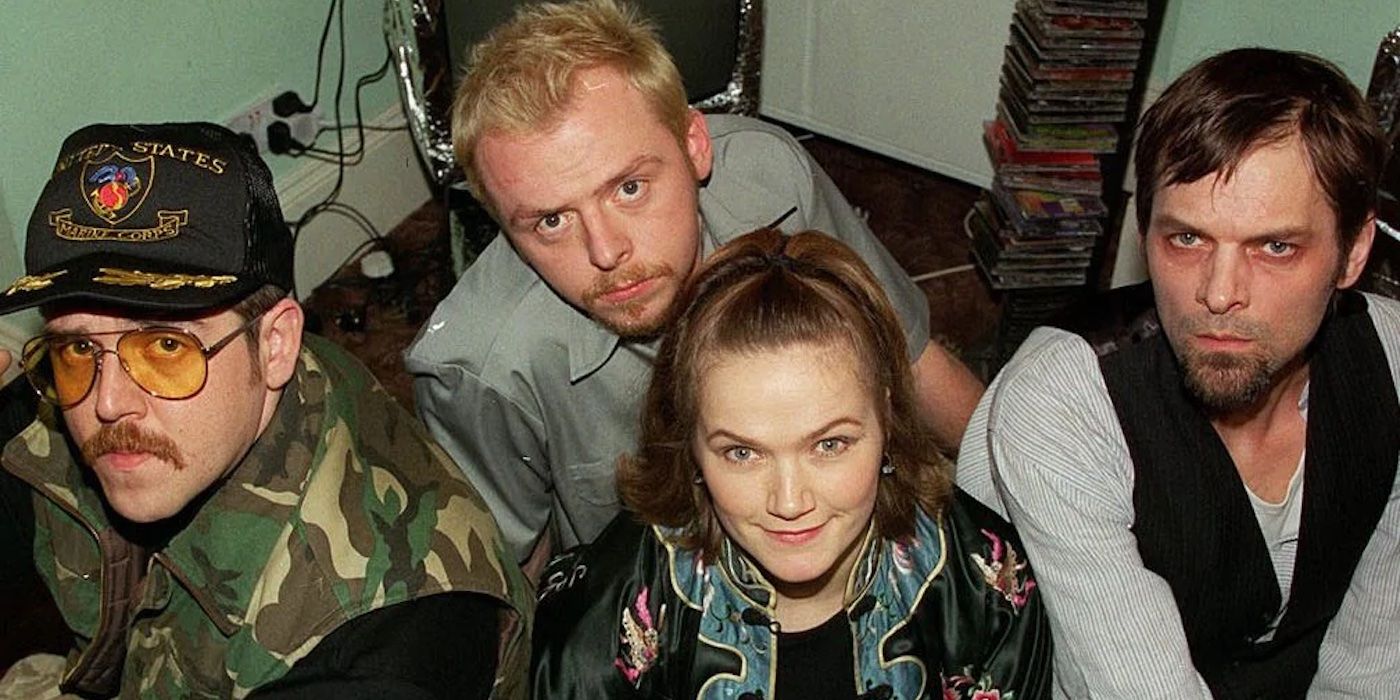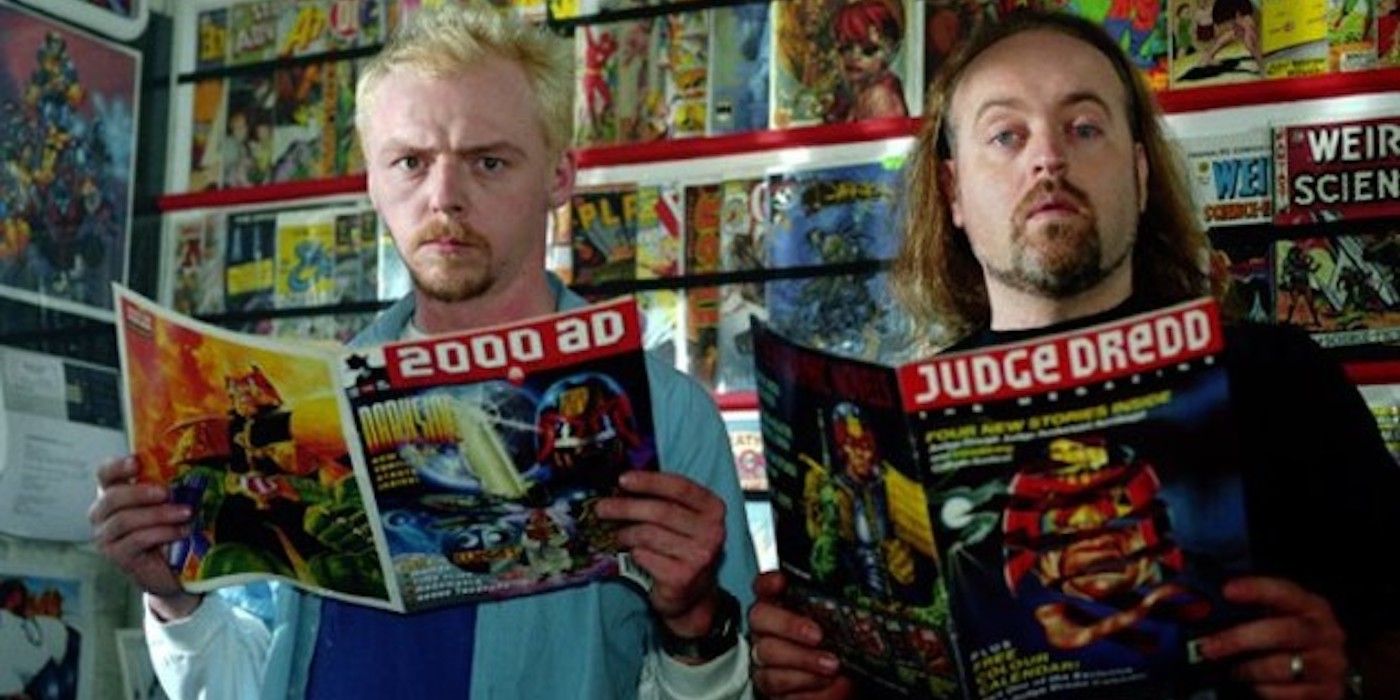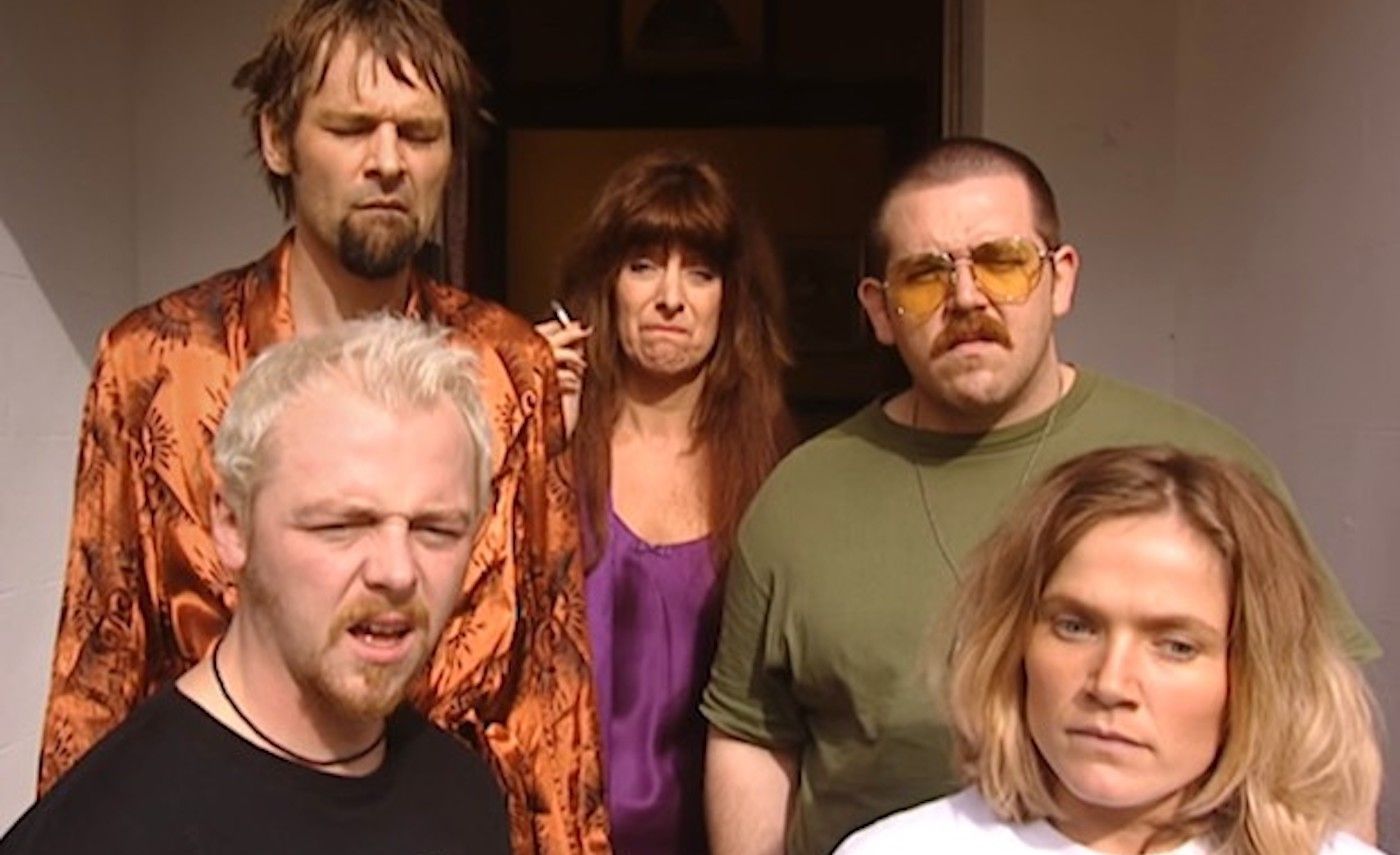Did you ever think about how much the apartment in 2 Broke Girls costs? With its wide, open space, natural light, and abundance of tastefully tacky furniture. Or The Big Bang Theory? With enough nerdy memorabilia to burn a hole through anyone's pocket. There comes a point in every young adult's life when they realize that moving out and living independently is nothing like how the sitcoms portray it. For one reason or another, your apartment is going to be below the standard of comfortable living, or it'll cost an arm and a leg to keep the lights on, or you'll end up living with people you'll come to regret ever meeting at all, or all of the above. Real life is never as polished as it is on TV, this is a concept most will understand. The Big Bang Theory isn't exactly going for realism, but with this disillusionment comes a yearning for fiction that speaks to your lived experience.
Spaced is an unfortunately short-lived British sitcom created by Simon Pegg and Jessica Stevenson and directed by Edgar Wright. Airing from 1999 to 2001, it followed the farcical misadventures of those living in a flat in North London. At the center of the story is a solid group of artists and outcasts trying to get by and possibly even make something of themselves. Despite its outlandish humor and scenarios, Spaced best encapsulates the lives of adults living independently, using its hindrances to its advantage to tell a funny, relatable story that outclasses many sitcoms in only fourteen episodes.
The first thing one will notice about the show is its aesthetics. Spurred on by a production budget of only £160,000 (about $193,000 US), the scant cost of the show works to produce a gritty, slightly dated style that secures the audience in a place and time. The flat that the main characters, Tim (Pegg) and Daisy (Jessica Hynes), live in is... ugly. 23 Meteor Street is small and cramped, the furnishing is modest, the walls are bland, the fridge freezes over everything, and they're at the mercy of a dysfunctional, alcoholic landlady who they share the flat with, along with another tenant in the basement. This is the usual standard of living for an aspiring artist making minimum wage and a freelance writer, with the only unrealistic element being that they managed to get a place in London at all. There are no bright, poppy colors, no laugh tracks, the characters aren't conventionally fashionable: It has none of the trappings of the traditional "adults living together" sitcom setup. This is common for a lot of British sitcoms that came out around the same time, such as Peep Show and Black Books. It's not a glamorous situation, but the characters and Wright make the absolute best of what they have.
The characters are also what makes this show so special. Their adventures may be full of hilariously overblown movie references, paintball wars, robot fighting rings, and heists for kidnaped dogs, but who they are as people and what they do with their lives hits incredibly close to home. Let's start with Daisy Steiner, an enthusiastic, cheerful, and totally aimless aspiring writer trying desperately to create her bestseller while simultaneously avoiding doing any of the actual work involved. This is something many writers can relate to, procrastinating because of the daunting pressure of creating a magnum opus, or even the crushing disappointment that comes with trying to become a working writer. She doesn't have witty comebacks but more so babbles along happily about what she's supposedly working on, considering herself an intellectual but then coming up short when she actually has to prove it. Disclaimer: the writer of this piece is not so focused on this character because she's exactly like her, she promises.
Next is Tim Bisley, amateur skateboarder, talented comic artist, and recent victim of a devastating breakup. Tim can be considered the only real "geek" of the show, with most of his personality and dialogue being attributed to his love of cult fiction, video games, and above all, Star Wars. He is also fortunate enough to have a regular job that relates to his interests - working at a comic book store. Despite this, the job doesn't pay well, and his seething hatred for The Phantom Menace even manages to get him temporarily fired from it (which is especially hilarious now in this new world of toxic nerd culture). His constant nerdy references act as a shield to stop him from showing any emotional vulnerability. Still, the references this one character makes result in much superior dialogue than anything said on The Big Bang Theory.
There are also side characters to the main two who polish off the realistic feeling of the show: Marsha, the aforementioned dysfunctional, alcoholic landlady who's actually rather lovely once you get to know her, Brian, the basement-dwelling artist who at first seems tortured and brooding but is really just shy and awkward; Mike, the overzealous TA cadet who's played by Nick Frost and therefore shares a beautiful companionship with Tim, reflecting his and Pegg's real-life friendship, and Twist, the ditzy fashionista and Daisy's "friend." None of these characters have particularly aspirational lives, they're not all in brilliant, diverse careers, and none of them even end up in stable relationships. You see them all having to get on in ways that aren't solved in the course of one episode; personalities clash, arguments happen, and while they make it work, something in the back of your mind wonders for how long.
What makes this show shine above the others, even relatively great UK comedies, like Black Books and Peep Show, that have the same down-to-earth style and characters struggling to make ends meet, is, of course, Wright himself. This is his debut, so you see the beginnings of that hallmark style audiences have come to know and love. The Cornetto Trilogy cast is one, along with the creative cinematography that shows that with enough imagination you can make an adventure from even the smallest budget. He does all this somehow without shedding the realism of the situation, fictionalizing the act of getting a soul-sucking customer service job by turning it into One Flew Over The Cuckoo's Nest, or an emotional blow-up with a housemate as a game of Tekken. It all makes for real life through the eyes of a show for nerds, by nerds, crafted with love and care.
While many of us wish for an outlandish misadventure, it rarely comes true. Just as many of us wish for a great apartment in a major city, with a fulfilling job and creative life, cool friends who we'll have forever, and steamy romantic endeavors. Spaced shows us, the struggling creatives who are struggling to write something, get a job, or pay rent - just generally struggling - that our mundane lives are just as much of an adventure and interesting as all the glamorous people on TV. It also reminds us what can be done on a small budget with enough ingenuity and perseverance, speaking to the truth of both the audience and, at the time, the cast and crew with daring amounts of honesty. Last of all, it shows us that the series with the most humor, heart, and poignancy usually last for only a short, blissful moment.



